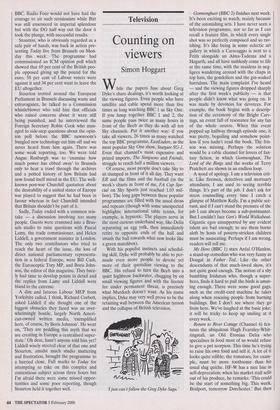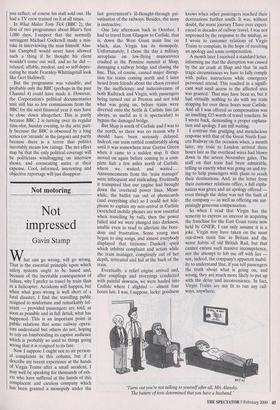Television
Counting on viewers
Simon Hoggart
While the papers fuss about Greg Dyke's share dealings, it's worth looking at the viewing figures. Even people who have satellite and cable spend more than five times as long watching BBC 1 as Sky One. If you lump together BBC 1 and 2, the same people pass twice as many hours in front of the Beeb as they do with all ten Sky channels. Put it another way: if you take all viewers, 26 times as many watched the top BBC programme, EastEnders, as the most popular Sky One show, Stargate SG-I. Even that channel's most expensive and prized imports, The Simpsons and Friends, struggle to reach half a million viewers.
Of course, most people don't take Sky to sit slumped in front of it all day. They want ER and the films and the football (in the week's charts in front of me, FA Cup Spe- cial on Sky Sports just reached 1.03 mil- lion). The long gaps between these popular programmes are filled with the usual dross and repeats (though with some unexpected highlights; international table tennis, for example, is hypnotic. The players serve in the most curious underhand way, like Delia separating an egg yolk, then immediately retire to opposite ends of the hall and smash the ball towards what now looks like a green matchbox).
With his populist instincts and schedul- ing skill, Dyke will probably be able to per- suade even more people to devote yet more of their quotidian viewing to the BBC. His refusal to turn the Beeb into a quiet highbrow backwater, chugging by on small viewing figures and with the licence fee under permanent threat, is precisely what Murdoch doesn't want. As his name implies, Dyke may very well prove to be the retaining wall between the American tycoon and the collapse of British television.
'I just can't follow the Greg Dyke Saga.' Gormenghast (BBC 2) finishes next week. It's been exciting to watch, mainly because of the astonishing sets. I have never seen a television programme, nor so far as I can recall a feature film, in which every single shot was so perfectly composed and so rav- ishing. It's like being in some eclectic art gallery in which a Caravaggio is next to a Frith alongside an Alma-Tadema and a Hogarth, and all have suddenly come to life at the same time, with the maidens in neg- ligees wandering around with the chaps in top hats, the gondoliers and the gin-soaked harridans. The main complaint I've heard — and the viewing figures dropped sharply after the first week's publicity — is that people didn't know what was going on. It was made by devotees for devotees. For example, the book begins with a descrip- tion of the ceremony of the Bright Carv- ings, an event full of resonance for any fan of the whole oeuvre. When this event popped up halfway through episode one, it was pretty, beguiling and somehow point- less if you hadn't read the book. The fris- son was missing. Perhaps the solution would be a cable channel for lovers of fan- tasy fiction, in which Gomzenghast, The Lord of the Rings and the works of Terry Pratchett are shown in an endless loop.
A word of apology. I am a television crit- ic. Like firemen, detectives and mortuary attendants, I am used to seeing terrible things. It's part of the job. I don't ask for stress counselling every time I catch a glimpse of Matthew Kelly. I'm a public ser- vant, and if I can't stand the pressure of the job I can always become a sub-postmaster. But I couldn't face Geri's World Walkabout. Gigantic egos unsupported by any evident talent are bad enough; to see them borne aloft by hosts of poverty-stricken children must be nauseating. Perhaps if I am wrong, readers will tell me.
My Hero (BBC 1) stars Ardal O'Hanlon, a stand-up comedian who was very funny as Dougal in Father Ted. Like the other descendants of that much-loved show, it's not quite good enough. The notion of a shy bumbling Irishman who, though a super- hero, finds it hard to pull the birds is amus- ing enough. There were some good gags, such as the credit-card machine he takes along when rescuing people from burning buildings. But I don't see where they go from here. We've laughed at the basic joke; it will be tricky to keep up smiling at it every week.
Return to River Cottage (Channel 4) fea- tures the ubiquitous Hugh Fearnley-Whit- tingstall, an Old Etonian Delia who specialises in food most of us would refuse to give a pet scorpion. This time he's trying to raise his own food and sell it. A lot of it looks quite' edible; the tomatoes, for exam- ple, must be more toothsome than his usual slug quiche. HF-W has a nice line in self-deprecation; when his market stall sells out of his produce, he remarks: 'This could be the start of something big. This week, Bridport, tomorrow Dorchester.' But then you reflect, of course his stall sold out. He had a TV crew trained on it at all times.
In What Makes Tony Tick (BBC 2), the first of two programmes about Blaies first 1,000 days, I suspect that the normally astringent Michael Cockerel] made a mis- take in interviewing the man himself. Alas- tair Campbell would never have allowed such a thing if he thought his client wouldn't come out well, and so he did — relaxed, affable, modest, and so self-depre- cating he made Fearnley-Whittingstall look like Geri Halliwell.
But the programme was valuable, and probably only the BBC (perhaps in the past Channel 4) could have made it. However, the Corporation's political documentaries unit still has so few commissions from the BBC for the next financial year it may have to close down altogether. This is partly because BBC 2 is turning over its regular time-slot, Sunday evening, to the arts; part- ly because the BBC is obsessed by a long series (or 'strands' in the jargon) and partly because there is a terror that politics inevitably means low ratings. The net effect may be that the only political coverage will be politicians windbagging on interview shows, and coruscating satire at their expense. Cool, informed, interesting and objective reportage will just disappear.



























































 Previous page
Previous page